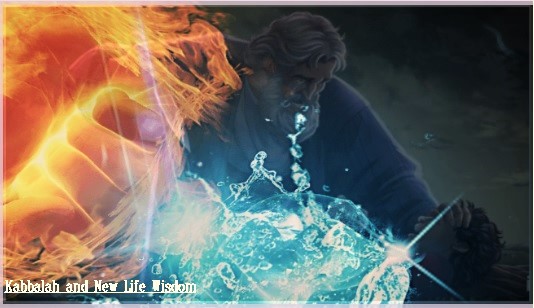Based on learning from Rav Yehuda Ashlag, here I would like to share with you some insights into the process of spiritual alchemy and inner transmutation, as understood through the lens of Kabbalah and New Life Wisdom.
The fundamental principle of spiritual alchemy is the idea that we can transform our inner selves, our consciousness, and our connection to the divine through the unification of seemingly opposing forces or aspects within ourselves. In Kabbalistic terms, this often involves balancing the divine attributes of Chesed (loving-kindness) and Gevurah (judgment), which correspond to the elements of water and fire, respectively.
To achieve this unification, we must first develop a deep understanding of ourselves and the world around us. This understanding is represented by the sefira of Binah, which allows us to discern the true nature of things and to recognize the interconnectedness of all aspects of creation.
Through study, meditation, and the practice of mitzvot (commandments), we can begin to harmonize the opposing forces within ourselves, drawing upon the guidance and wisdom of the Torah and the Kabbalistic tradition.Avraham’s willingness to sacrifice his son Yitzchak at God’s command represents the attribute of Gevurah, or judgment. Avraham’s unrelenting obedience and commitment to God’s will symbolize the unwavering force of fire, which can be both destructive and purifying.
Yitzchak, on the other hand, embodies the attribute of Chesed, or loving-kindness. His willingness to accept his fate and trust in God’s plan demonstrates the yielding, receptive nature of water.
Through their actions, Avraham and Yitzchak show us that the path to spiritual transformation involves balancing these opposing forces within ourselves—embracing both the fierce determination of fire and the surrender of water. It is in this synthesis that we can truly draw closer to the divine and fulfill our highest potential.
While it’s true that Avraham is often associated with the attribute of Chesed due to his generosity, kindness, and compassion towards others, the story of the Akeidah (the Binding of Isaac) reveals a deeper aspect of his character—one that demonstrates the Gevurah-like qualities of obedience, discipline, and willingness to perform even the most difficult of tasks in service of God.
Similarly, while Yitzchak is generally associated with Gevurah, the attribute of judgment, his acceptance of his fate in the Akeidah story also demonstrates Chesed-like qualities of trust, faith, and surrender.
This seeming paradox highlights the complexity of human nature and the potential for each of us to embody both Chesed and Gevurah in different circumstances. The challenge is to find the right balance between these opposing forces, just as Avraham and Yitzchak did in their own unique ways.
1. Rabbi Shimon Beresheet B in the Zohar explains that Tiferet represents the perfect balance between the divine attributes of Chesed (loving-kindness) and Gevurah (judgment). The blessings that emanate from Tiferet are thus a harmonious blend of compassion and justice, illuminating the world with divine light and guidance.
2. Talmud Esser Sefirot offers commentary on the nature of these blessings, stating that they are not merely passive illuminations, but rather active forces that shine forth and permeate all aspects of creation. This dynamic quality of Tiferet’s emanations allows for ongoing spiritual growth and transformation, as individuals and communities strive to align themselves with the divine will.
These texts invite us to appreciate the profound significance of Tiferet’s blessings, as they not only provide light and guidance but also empower us to become agents of positive change in the world.

20. On a high level inside this chamber stand the ten appointed ministers, who are Rabbi Akiva and his friends. They all go up through the upper mirror – WHICH IS THE SECRET OF THE LUMINOUS MIRROR – and shine with supernal, glorious splendor. Of them it is written: “Neither has the eye seen, that Elohim, beside You, should do such a thing for him that waits for Him” (Yeshayah 64:4).
שֶׁעֲשָׁאָה אַחַד עֲלִיָּא עָלְמָא, הֵן שִׁית רָזִין הוּן כְּרִיכוֹתִין בְּהִין, הֵן הִין: כֶּתֶר, בִּינָה, וְדַעַת
“When the Holy One created the world, six supernal mysteries were engraved upon it, which are the sefirot: Keter, Binah, and Da’at.”
In the context of attaining the angels of Tiferet, understanding the roles and relationships between these sefirot can help us align ourselves with the divine wisdom and balance that Tiferet represents. By studying and meditating upon these supernal mysteries, we can deepen our connection to the spiritual realms and open ourselves up to the blessings and guidance offered by the angels of Tiferet.


